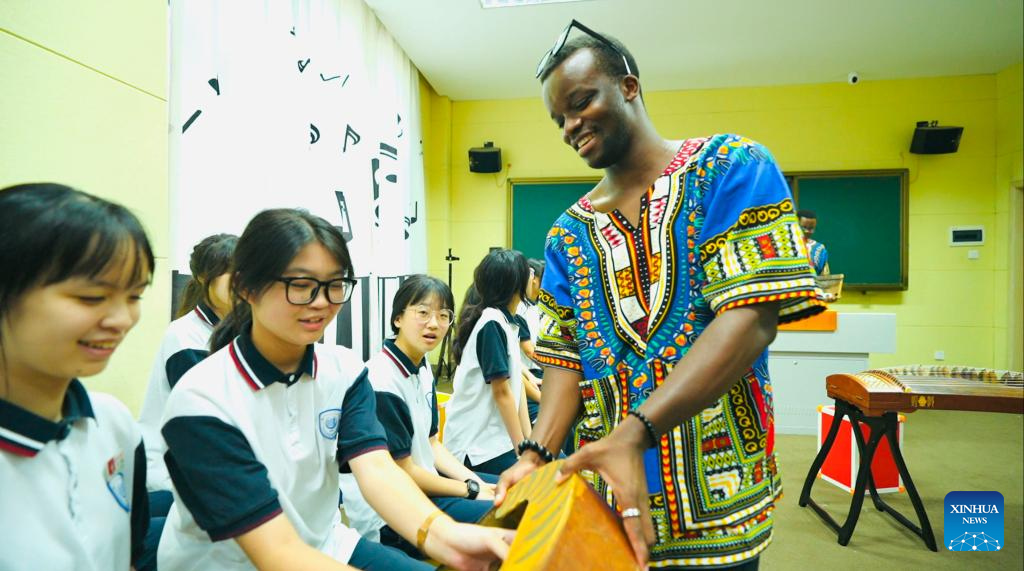
Joseph Olivier Mendo'o, executive director of the International Exchange Department at the China-Africa Business Council, introduces African culture to Chinese students during his visit to Xindeng County in Hangzhou, east China's Zhejiang Province, Aug. 25, 2022.(Xinhua)
BEIJING, Aug. 25 (Xinhua) -- As a doctoral graduate in international relations, Joseph Olivier Mendo'o, a Cameroonian man who loves reading, has discovered an enduring "book" in China. It is a tale he may never fully finish as it tells the story of the vast expanse of China's villages and their rural revitalization endeavors.
In 2013, Mendo'o graduated from the Free University of Berlin and returned to Cameroon, where he witnessed a number of Chinese-built infrastructure projects initiated under the Belt and Road Initiative and China-Africa cooperation. These developments sparked the curiosity of the then 20-year-old, prompting him to wonder about the distant land of China.
Driven by a desire to explore this faraway country, he enrolled in the Confucius Institute in Cameroon to learn Chinese, hoping to one day visit China and discover it for himself.
In 2016, Mendo'o realized his ambition by joining the School of International Studies at Peking University as a student pursuing a master's degree. However, he didn't limit his education to the campus. Over the years, he has visited about 50 different villages across China, where he focused his attention on local conditions and customs, and most importantly, grassroots efforts in the quest for rural revitalization.
"I come from Cameroon, an agriculture-based country, as are many African countries. I am very interested in how China helps rural areas develop, how to narrow the urban-rural gap, and how to alleviate poverty and ensure that the poor will not return to poverty. Africa needs such experience," said Mendo'o.
During his years of studying in China, Mendo'o has followed village officials around to understand their daily work, asking them questions like how to sell agricultural products from mountainous areas, and how to provide support for elderly people in their village.
He was impressed by the innovative yet practical approaches adopted by these villages. In a small village called Hezhai in Lankao County, central China's Henan Province, he found that villagers' income increased remarkably by developing the pear production industry, which includes growing pears and producing pear juice and dried pears.
In Shahao Village located in the dry region of north China's Shanxi Province, local villagers found their way to prosperity by developing traditional paper-cutting art. When Mendo'o took this story back to his native Africa, people there were amazed to learn that a cultural craft could drive economic growth in rural areas.
What struck Mendo'o most was the close bond existing between the local government, village officials and the community in the places he has visited in rural China.
"They know which family has a kid studying in the city, who is facing health challenges and what their needs are. This enables them to provide targeted solutions to address each problem, making the process both simple and efficient," Mendo'o explained.
As a result, he has acquired a deeper understanding of the people-centered approach taken by the Communist Party of China.
Mendo'o was also impressed by the active involvement of young people in rural revitalization.
"I have seen many young village officials who have just graduated from big cities like Beijing and Shanghai, and they volunteered to devote their knowledge and energy to rural revitalization," Mendo'o said.
Mendo'o has observed that many young African people are eager to promote cooperation between China and Africa, after completing their studies in China. Recognizing the vital role of the youth, he co-founded the China Africa Youth Federation in 2019 to organize exchange programs.
After graduating from Peking University, Mendo'o stepped into a new role as the executive director of the International Exchange Department at the China-Africa Business Council. He aspires to serve as a bridge between Chinese companies and Africa to foster greater cooperation.
In September this year, Mendo'o plans to embark on a new journey to coastal rural areas in Fujian Province to learn more about rural revitalization in that part of China.
"'As long as you work hard, you can grind an iron rod into a needle.' This is the Chinese proverb that has had the most profound impact on my life. It signifies that perseverance can make the impossible possible, much like China's path to poverty alleviation and my own life's journey," Mendo'o said. ■



